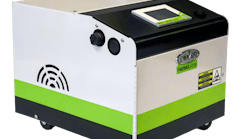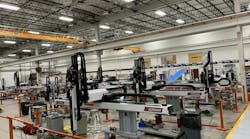By Karen Hanna
Rapid Purge President and CEO Joe Serell isn’t one to shy away from risk or adventure. In traveling through more than 30 countries and territories, motorcycled around Japan and even climbed Mount Fuji.
A CrossFit athlete who quit martial arts about 10 years after suffering a fractured rib and partially collapsed lung, he began life after college moonlighting as a professional blackjack player. Recently, he talked about his career — and his biggest bet — in a recent conversation with Karen Hanna, senior staff writer for Plastics Machinery & Manufacturing.
How did you get into plastics?
How did you land at RapidPurge?
Serell: I was with Asahi Kasei for about 15 years. It was a great experience, great company. I was treated very well. In 2018, I was promoted to president. I was very happy, but, in the back of my mind, going back to when I was a student, I always wanted to be an owner, not an employee.
When I became president, that made that much harder, because I felt like, “Is this really what I want? Why would I leave now?”
I'd been thinking about starting my own investment company, and, so, with the help of some investors, I decided to look for small companies that had good bones but needed commercial expertise to help them grow. One of the first companies we reached out to was RapidPurge. One of the many things I liked about the company was that it has a really good brand name.
The company started in 1979. Before that, people used whatever concoction they came up with in the plant. [In] the ’80s and early ’90s, RapidPurge dominated, but then competitors came in. Little by little, they took over the market, RapidPurge never really adjusted, so, [its] market share fell, but [it] still had a dedicated following. [RapidPurge] sort of fell off the map. While the company was still growing, and still very profitable and healthy, it wasn't as successful as it could have been. The owner was semi-retired; RapidPurge provided a good living for him, with very little effort.
He used to use an expression that he liked to fly under the radar. He was a very talented manufacturing engineer. His goal was not to grow the company, but to eliminate what was a tremendous amount of waste at the time. He did a very, very good job, so, we are extremely lean. It was a perfect place for me to step in because [the former owner] had done the hard work.
I just called him up and said, “We're looking to make investments,” assuming there was no interest in selling because it wasn't on the market. [The owner] wasn't considering retiring at the time but felt it was a good time for him. It was very fortuitous. Things fell into place very quickly. We got a deal done in the late summer of 2019.
One of my favorite sayings, is, “Be bold, and mighty forces will come to your aid.” Leaving [Asahi Kasei] was bold; it was very, very risky because I didn't know how it was going to go after that. If I hadn't done it, I would have been happy where I was, but I would have always wondered, “What if I'd made that leap?"
You'd played cards professionally in Atlantic City, N.J. How did that come about?
Serell: I was finishing [college] around 1990 at night. There was an advertisement for one free lesson for a Doug Grant card-counting school. Obviously, one free lesson means they're going to try to get you to do more lessons. In this one lesson, they do teach you how to count cards, but there's a lot more to playing professionally; you have to know when to hit, when to increase your bets and so forth. At this free lesson, it was me and maybe two dozen other people, almost every one of them retired men. I really stood out because I was 22 at the time.
At the end of the lesson, the dealer [leading the lesson] said, “Will you sign up for the school?”
I said, “I don't know if I really can.” I think it was $1,200. That was about $1,199 more than I had. So, I was like, “I'm sorry, I'd love to do it, actually, but it's just not in the cards for me.”
I said to her, “Listen, you had a table full of guys here who looked like they had money, but you're trying to sell this to the one guy who doesn't look like he has any money, and in fact doesn't.” She said to me, “The [training] college is a money-making venture. What we really want to do is recruit the best players to play on our team, and a big part of playing is not looking like a professional gambler.” They really prized people who were not retirement-age men. I thought, “That's the coolest thing I've ever heard.” I said to her, “I love the idea, I would love to do it, but I just don't have the money.” Then one of the owners of the school said, “What if you take the lessons, and, if you make it onto the team, we will pay for the school out of your profits?” So, I did.
This was a New Jersey corporation, and they played in Atlantic City. It wasn't like a shady mafia thing. You know, it was a little shady, I guess. … Anyway. They would send out teams of five or six people. Four people would count and two people would play. We'd have one person sitting at the table, and he or she would count and bet the minimum every hand. As the count [was] favorable, that person would give a signal — he'd stand up or take off his hat or whatever. Then, [another] player would walk up next to him. As soon as the other team member is standing next to him, he would get up and leave, so another [person] could sit down. In that passing, the counter would whisper the count.
After some time, the casinos were on the lookout [for] a professional team operating. The casinos, they're not going to be OK with a professional team.
As soon as they [identified] somebody, then they would chase that person around and try to [ID] everybody else on that team, take pictures, the whole thing. It was high drama, actually.
The casinos got so good at recognizing the team members, they just shuffled anytime anybody sat down [rather than deal only the cards that hadn’t yet been played — negating the benefit of counting cards]. It just made the whole endeavor impossible.
What was that lifestyle like?
Serell: [The company] loved having me, that was I was the youngest person on the team. I just didn't look like a professional. I dressed like I had money and bought a fake gold watch.
At the beginning of a shift the players were given $5,000 in $100 bills, and they would play with that $5,000.
Any pockets in any of our clothes had to be sewn shut, because it'd be way too easy to just pop a $100 chip.
I was still living at home. One time, I forget how it happened, my mom picked up a pair of pants of mine, and she was like, “What the hell is this?” Then, I told her. She and my dad were really obviously very uncomfortable with it. They were very concerned about it, but it was a very strictly professionally run group.
[People worked] four-hour shifts, and you couldn't work more than two shifts a day. [The company] didn't want people getting sloppy, obviously.
During this time, I was a carpenter during the day and a student at night. So, I would do a shift on Friday night, two shifts Saturday and two shifts Sunday.
If you're playing at a high level, and you're doing everything correctly, I think the calculated advantage over the casino at that time was about 2.5 percent. [But] on any given shift, you might lose $5,000. It doesn't mean you did anything wrong. The entire winnings were distributed by how many shifts you worked during that month. I averaged about $24 an hour.
It was great money. It was so much fun. The casinos were throwing comps at me, because I was running around with $5,000 in my hand, betting $500 at a time. I was getting rooms and meals and other things. I [was] playing and looking like a rich guy and throwing around thousands of dollars.
After that, you went to Japan, where you taught English and, eventually, also dealt baccarat and 21. Why Japan?
Serell: I was involved in martial arts for a long time when I was younger. I was also very influenced by Japanese philosophy, such as Buddhism. I felt it would be incredible to live overseas, learn another culture, travel, speak another language and fully learn it.
I felt Japanese would be a strong language for international business. I might have been off on that point. [At] one of my first interviews when I got back, the owner of the company asked me, why did you learn Japanese? I told him my reasons, and he said, “Well, you should’ve learned Chinese.” He was ahead of his time. But I don't regret it for a minute.
I was there for about three and a half years — I studied very hard, and I worked, but there was also that experience of having some time and traveling.
I did a number of different martial arts. [In Japan,] it was just Kyokushin. I attained the level of brown belt. Much more important than the belt or ranking was that [the karate school, or dōjō] was one of the few places that when I went there, I wasn't a foreigner; I was just another person practicing that karate. That dōjō — along with my homestead — was the one place where I was not an outsider.
It was an interesting martial art because its philosophy was that you can't learn karate, unless you're actually using it. So, they had tournaments that were full contact, no gear. The only rule [was] no punches to the head, but you could kick to the head. After the first belt promotion, which required actual fighting and a lot of pain, the other students looked at me differently, like, “OK, he's here to stay, and he's one of us now.”
That was an amazing time of my life, every day waking up and learning. I stayed with a family. We didn't use English in the house at all.
Before I came home, I toured the main island for a month by motorcycle. Then, I went to Vietnam and Thailand, and backpacked in each of those countries for a month.
I was thinking three months of backpacking and traveling, I'd be burnt out on it. But I could have done that indefinitely.
Serell: You learn about the culture and the people of the country that you go to, but almost as importantly, you learn about your own country through different eyes. You learn how people look at you, good and bad. It's very educational. Not enough Americans spend time abroad.
What motivates you?
Serell: I'm a competitive person and have a strong drive to succeed. It's not even a matter of making more money or having bigger, better things. It's really about doing things well, and doing good.
I take a lot of pride in the fact that we were an American company. We sell worldwide, but we're fundamentally helping other American companies become more competitive, less wasteful, more efficient. I love the fact our product is helping the environment.
The first [motivator] is customers, and helping them and all the good we do every day with our products in their facilities. And the second thing is, I love the fact that I've been able to give people great opportunities and help them grow. Every day when I come to work, I know that if I do a good job, it'll create opportunities for the people that work with us.
What have you done to raise RapidPurge’s visibility?
Serell: I've been in the industry for 15 years prior to buying this company, so, I reached out to people I know who were in sales, outside reps, distributors, users and hired marketing agencies. We revamped the website. We [had] a trade show planned in September in Michigan, and NPE next year. There have been a number of people who may have been like, “Oh, wow, it's RapidPurge, I didn't know they were still around.” But the name itself is very strong and very familiar.
We're about two years behind plan. We hit some unexpected issues with COVID, with supply chain shortages. The plan we set out when I bought the company had to be modified as we went. But we've actually enjoyed very, very strong growth.
What trends do you see in demand for purging compounds?
Serell: I think most processors are familiar with it. A great many are using a purge compound. It's now a matter of value proposition — the performance versus the price. The market for purging compounds is definitely growing. From what I can tell, it's growing faster than the market for plastics in general.
There are a lot more high-end products being made from plastics. When you have things like high-performance automotive parts, even things like cosmetics packaging, the consumer experience is very important. That plastic has to be perfect; you can't have black specks, you can't have color contamination. There are a lot of other things to the concept of Kaizen, the continuous improvement movement, where companies are encouraged to improve every process every day, no matter how small the change or improvement, just to keep looking for ways to improve efficiency or reduce waste.
[Purging compounds are] well-established in the United States, Europe and Japan. But in a lot of markets, the idea of using a commercial purging compound has not been widely accepted, and we're seeing demand from those markets, as well.
What is the potential for developing new compounds?
Serell: It's a mature market so the easy purge compounds have been developed. As new resins are developed, especially the higher-performing engineering resins, new purge compounds are being developed to address those needs. We're working on one product we're hoping to be able to introduce within the next year. It's an entirely different approach. It uses materials that aren't being used by anyone. It would address a segment of the industry that's underserved. We're even looking into patents on that product, which is not the norm for a purging compound; most of it is just IP.
What have you learned that you’d like to pass on?
Serell: If you want to do [something], you’ve got to make it happen. If you wait for the perfect time, you'll probably be waiting forever. [For example], part of that was leaving my last job to start this company. When I got promoted to president, it sort of [was] a very bad time because I finally reached that level of success and everything that comes with it. To leave for nothing was scary. At the end, I realized there won't be a perfect time.
The biggest gamble of my life was leaving my job and starting my company. And, ironically, I don't really bet on anything else anymore.
The other thing I would say is I've learned to ask for help. I sort of always felt like it's my job to do it [myself]. I did not ask for help enough. I've come to learn most people are happy to help. People ask for my help, I'm very happy to share whatever I can offer. I would encourage people to do the same, because most people, whether it's within that company or without, are very happy to help.
What would you like your legacy to be?
Serell: Professionally, I would want to be remembered as a good employer, somebody who didn't just sign a paycheck but helped people develop their career [and] provided opportunities, provided mentorship and instruction so they can better themselves and their families. And that I was honest and fair.
Personally, that I was a great husband and father.
If my kids grow up happy and healthy and productive, I will have considered my time here successful.








